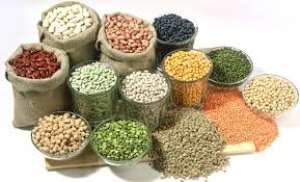
Accra, Nov. 22, CDA Consult - Ghana Grains Council (GGC) and the fully integrated Financial and Commodities Ecosystem (FinComEco) have signed a Master Collaboration Agreement (MCA) to jointly develop a range of platforms, projects and initiatives in the agricultural commodity markets sector, especially for grains and legumes in Ghana.
In a statement to the Communication for Development and Advocacy Consult (CDA Consult) in Accra signed by Mr Hirander Misra, Founder and Deputy Chairman of FinComEco, said the MCA seeks to link agriculture to the latest financial technology.
He said the joint venture will facilitate grain and legume crop value chain efficiencies through provision of strategic services including electronic warehouse receipts enablement, financing, standards, training and capacity building and the provision of marketing information.
Mr Misra explained that the GGC and FinComEco will also aim to work with development organisations such as World Bank Group, research bodies and local private sector partners to ensure the success of the collaboration for the benefit of the Ghanaian agricultural sector and associated trading with related agri-financing facilitation.
He said the aim is to develop an effective strategic working alignment with the Ministry of Trade and Industry to operationalise the Ghana Commodity Exchange (GCX), when it becomes operational.
He said FinComEco will also provide global best practices in managing robust warehouse receipt systems and other solutions as part of the wider FinComEco model.
This includes distribution of third party agri-finance and electronic banking facilitation enabled by scalable technology supported by its partner GMEX Group, which aims be integrated into the commodity exchange ecosystem in due course.
“We are delighted to be working with GGC to bring the FinComEco initiative to Ghana. Our unique collaborative approach is delivering best-of-breed technology, standards and inputs including seeds, fertilisers and pesticides to link the supply to demand agricultural value chain,” he said.
Mr Gideon Aboagye, GGC Chairman noted: “As a local giant in the promotion of Warehouse Receipt System (WRS) in Ghana, collaborating with FinComEco, a company with an international reputation in the ecosystem, is the right decision to move WRS to a different level, as we move towards the operationalising the emerging commodities exchange”.
He said GGC is a private sector-led initiative formed with initial funding from USAID’s ATP and ADVANCE projects.
It is a body formed by leaders in the grains business with the aim of positively intervening in the grains and legume value chain to achieve improvement in productivity, quality and greater commercialisation of the industry.
Mr Aboagye said the GGC oversees 28 certified warehouses across the country, with 99 members.
Additionally, its advocacy relationship with government and public institutions will enable the collaboration to help facilitate extended market access and influence policy change, he said.
He said GCC’s objectives include the responsibility to facilitating grain and legume value chain efficiency in Ghana through the provision of strategic value-added services including regulated warehouse receipting, financing, training and capacity building, provision of marketing information and other value-added services including market linkages, as well as policy change interventions for the agricultural industry.
The WRS is responsible for certifying and enforcing agreed standards for the grains industry. Increased quality, productivity and profitability by positive interventions within the grains value chain.
FinComEco, is a financial and commodities ecosystem is fostering financial inclusion with social responsibility in collaboration with local stake-holders, development organisations, governments and the private sector with the aim of improving food security and economic diversity.
The new electronic commodities exchange solution is establishing and reinvigorating local spot exchanges and enabling trade across multiple regions with a focus on the agricultural sector to create a holistic secure financial system.





 Lay KPMG audit report on SML-GRA contract before Parliament – Isaac Adongo tells...
Lay KPMG audit report on SML-GRA contract before Parliament – Isaac Adongo tells...
 Supervisor remanded for stabbing businessman with broken bottle and screwdriver
Supervisor remanded for stabbing businessman with broken bottle and screwdriver
 NDC watching EC and NPP closely on Returning Officer recruitment — Omane Boamah
NDC watching EC and NPP closely on Returning Officer recruitment — Omane Boamah
 Your decision to contest for president again is pathetic – Annoh-Dompreh blasts ...
Your decision to contest for president again is pathetic – Annoh-Dompreh blasts ...
 Election 2024: Security agencies ready to keep peace and secure the country — IG...
Election 2024: Security agencies ready to keep peace and secure the country — IG...
 People no longer place value in public basic schools; new uniforms, painting wil...
People no longer place value in public basic schools; new uniforms, painting wil...
 'Comedian' Paul Adom Otchere needs help – Sulemana Braimah
'Comedian' Paul Adom Otchere needs help – Sulemana Braimah
 Ejisu by-election: Only 33% of voters can be swayed by inducement — Global InfoA...
Ejisu by-election: Only 33% of voters can be swayed by inducement — Global InfoA...
 Minority will expose the beneficial owners of SML, recover funds paid to company...
Minority will expose the beneficial owners of SML, recover funds paid to company...
 Prof. Opoku-Agyemang has ‘decapitated’ the NPP’s strategies; don’t take them ser...
Prof. Opoku-Agyemang has ‘decapitated’ the NPP’s strategies; don’t take them ser...
